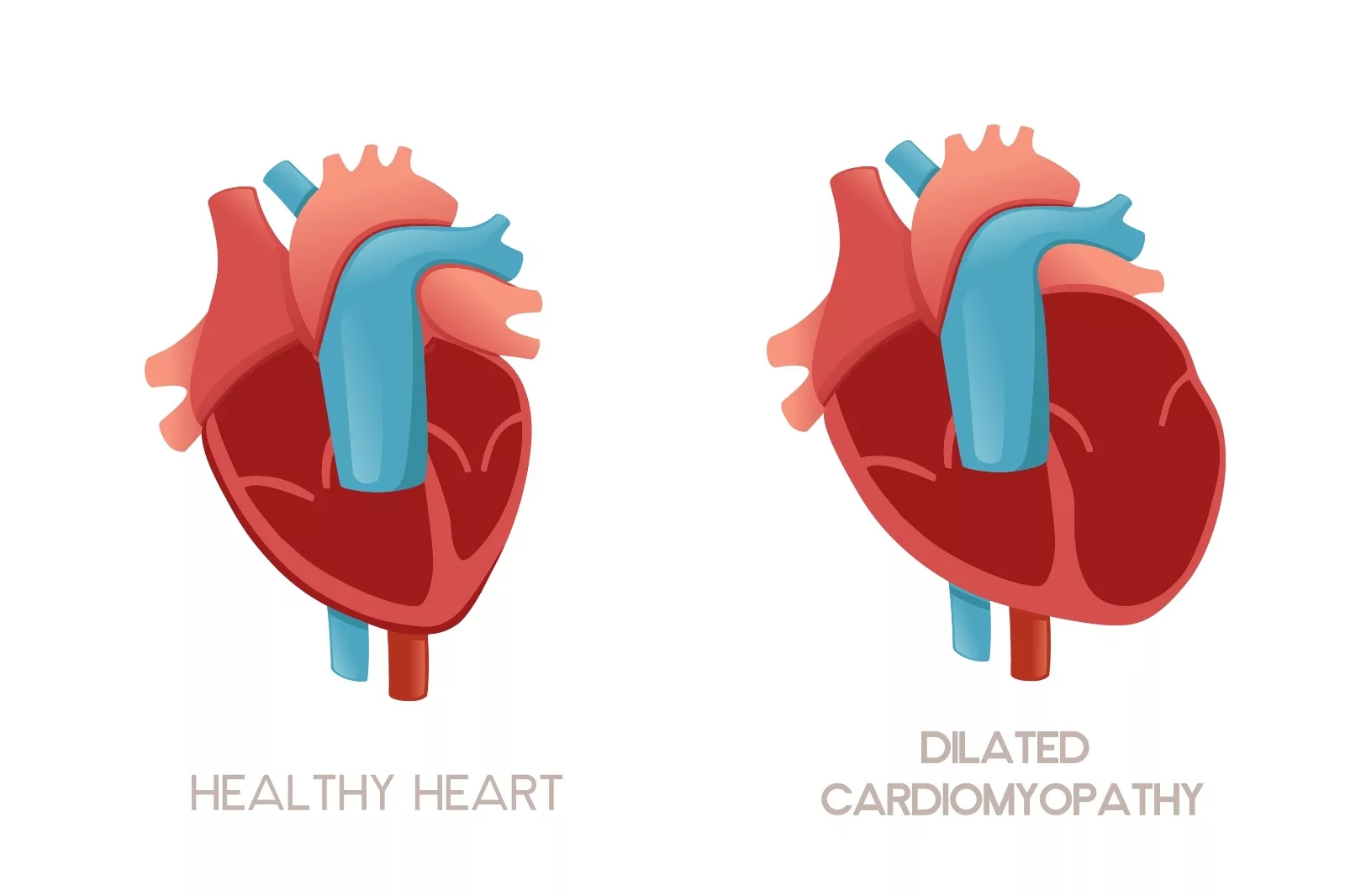Fatigue and shortness of breath are becoming very common in young and older populations. There can be multiple reasons for fatigue and breath shortness. Dilated cardiomyopathy (DCM) is one of them.
What is Dilated Cardiomyopathy?
Dilated cardiomyopathy (DCM) is a type of heart disease that affects the heart muscle, causing it to become stretched and weakened. This results in the heart being unable to pump blood effectively, leading to symptoms such as fatigue, shortness of breath, and swelling in the legs and feet.
Due to multiple reasons, both known and unknown, the heart muscles stretch and thin out due to an increased workload or intrinsic weakness of muscle fibers. As a result of the stretching of muscle fibers, the heart chambers increase in size but are weak.
The most commonly involved chamber is the left ventricle because it is the heart’s main chamber, so a greater workload is on it. The weak heart muscles can not pump adequately, thus can result in heart failure.

Causes of Dilated Cardiomyopathy
The causes can be divided broadly into two categories:
- Genetic
- Acquired
Genetic mutations account for up to 35% of cases.1Weintraub, R. G., Semsarian, C., & Macdonald, P. (2017). Dilated cardiomyopathy. The Lancet, 390(10092), 400-414.
Among acquired causes, the most are viral infections. Viruses invade the heart muscles and cause inflammation called myocarditis. This results in the destruction of muscle cells, so they dilate, resulting in cardiomyopathy.
The other common cause of DCM is the following:
- Coronary artery disease
- Hypertension
- Arrhythmias(irregular heartbeat)
- Diabetes
- Obesity
- Heart valve disease
- Alcohol abuse
- Excessive iron in the heart
- Complications of pregnancy
Dilated Cardiomyopathy Symptoms
Due to DCM heart will not work properly. Cardiac output is decreased in this condition, so there is a decrease in the blood supply of body tissues. This results in the following characteristic signs and symptoms:
- Difficulty in breathing
- Chest pain
- Palpitation
- Difficulty in raising upstairs
- Fatigue
- Swelling of legs due to fluid buildup
- Cough sometimes
Diagnosis of Dilated Cardiomyopathy
Dilated cardiomyopathy is diagnosed through a combination of a person’s medical history, physical examination, and laboratory tests.
The doctor will first ask about the individual’s signs, symptoms, and medical history. This will be followed by a physical examination, during which the doctor will look for any physical problems. After this, the doctor will advise the person on some diagnostic tests to be performed in the laboratory.
The most commonly done diagnostic tests are:
• Echocardiography: The first-line test for diagnosing DCM is echocardiography, which uses sound waves to create an image of the heart. This allows doctors to see blood movement in and out of the heart.
• Cardiac Magnetic Resonance: The next diagnostic test is cardiac magnetic resonance (CMR). This test is often considered the best option for diagnosing DCM because it provides a clear assessment of blood in the ventricles and blood pumped through each beat.
• Heart Biopsy: In some cases of DCM, a heart biopsy may be used for diagnosis. This involves removing a small amount of heart tissue for examination.
Complications of Dilated Cardiomyopathy:
The most common complication of DCM is heart failure. Due to weakness of the heart muscles heart fails to pump whatever blood comes into it.
Sudden cardiac arrest may occur in some cases of dilated cardiomyopathy. The DCM may progress to chronic heart failure if the patient is not treated in time.
Blood clotting is also a very common complication with DCM.
Natural Ways of Reducing Dilated Cardiomyopathy Complications
Wondering how to cure dilated cardiomyopathy naturally? Well, there is no natural cure for it. However, natural methods can help reduce complications and promote longer life. Some effective natural methods for dilated cardiomyopathy include the following:
- Take low cholesterol diet
- Take a diet rich in whole grains
- Eat fruits and green vegetable maximum
- Do exercise as per your doctor’s prescription
- Avoid alcohol
- Smoking cessation is also essential, as smoking is a risk factor for heart disease.
- Maintain healthy weight
- Stress management techniques, such as yoga, meditation, or counseling, can help reduce stress levels, which may alleviate symptoms.
Note: if you are diagnosed with DCM, you must see your doctor first. Use the above natural ways and your doctor’s prescription for maximum results.
Treatment Options for Dilated Cardiomyopathy
There are many treatment options available for dilated cardiomyopathy. Your doctor will suggest you the treatment most suitable for your heart condition at that time. Note treatment varies from person to person, so never start treatment at home; always consult your doctor.
Treatment of dilated cardiomyopathy depends on the cause. The goal of treatment is to remove the cause and reduce the symptoms. For example, if the viral infection is the case of DCM, your doctor may prescribe you corticosteroids. Corticosteroids are drugs that help to suppress the immune system and help treat myocarditis(inflammation of heart muscles).2Chen, H. S., Wang, W., Wu, S. N., & Liu, J. P. (2013). Corticosteroids for viral myocarditis. Cochrane database of systematic reviews, (10).
Treatment strategies can be divided into three categories:
1. Lifestyle Modification
Lifestyle modifications can help manage Dilated Cardiomyopathy. Apart from the natural tips discussed above, one important change is adopting a heart-healthy diet low in saturated and trans fats, salt, and cholesterol. It’s essential to note that healthcare professionals recommend implementing lifestyle modifications with medical treatment, such as medication or surgery.
2. Medical treatment
Follow your doctor’s prescription when using medicines. Your doctor may prescribe commonly used drugs such as angiotensin-converting enzyme inhibitors, angiotensin receptor blockers, beta-blockers, diuretics, etc.
- Diuretics: These drugs help eliminate excess fluid in the body, preventing edema and decreasing the strain on the heart.
- Blood pressure lowering drugs: Doctors commonly use medications such as angiotensin-converting enzyme inhibitors, angiotensin receptor blockers, and beta blockers to treat high blood pressure. These medications function by lowering blood pressure and reducing the workload on the heart.
- Anticoagulants: Doctors also use anticoagulants, commonly known as blood thinners, to treat dilated cardiomyopathy.
- Digoxin: Digoxin is a drug that helps the dilated heart to pump better by increasing the force of contractility. This makes it the drug of choice in the treatment of dilated cardiomyopathy.
3: Surgical treatment
In the later stages of DCM, patients may require some surgical procedures such as ablation. In some cases, doctors may recommend a heart transplant. Additionally, surgeons may need to implant a device in the heart to improve its function.
- Biventricular Pacemaker: Doctors surgically implant this device in the heart. It improves the pumping ability of both the right and left ventricles.
- Ablation: Ablation is a surgical procedure during which the surgeon removes some muscle fibers from the dilated heart.
- Heart Transplant: When other medications and surgical procedures have failed, doctors often view a heart transplant as a last resort. However, many factors determine whether a heart transplant is the best option for a patient. The patient’s age, health, and lifestyle all influence the decision.
Life Expectancy
The mortality rate of dilated cardiomyopathy varies with the patient’s age, overall health condition, and, most importantly, the cause of dilated cardiomyopathy. Some people diagnosed with dilated cardiomyopathy shows no symptoms and have a normal life span. Others may die of sudden cardiac arrest.
According to research3Xiao-Rong, X. U., Meng-Meng, H. A. N., Yi-Zhen, Y. A. N. G., Xin, W. A. N. G., Dong-Yan, H. O. U., Xian-Chen, M. E. N. G., … & Lin, X. U. (2022). Fifteen-year mortality and prognostic factors in patients with dilated cardiomyopathy: persistent standardized application of drug therapy and strengthened management may encourage change in an aging society. Journal of Geriatric Cardiology: JGC, 19(5), 335. conducted on 161 dilated cardiomyopathy patients over 15 years. The survival rate in the first five years was 44.1% at ten years, 38.5%, and 34.2% at 15 years.
What is Familial Dilated Cardiomyopathy?
Familial dilated cardiomyopathy is a heart disease due to genetic mutations. It is named “familial” because it can often be inherited and run in families. The researchers have found mutations in more than 16 genes that contribute to the development of familial dilated cardiomyopathy. These genes are responsible for the formation of proteins in cardiac muscle cells. When there is a mutation, the heart muscles become thin and weak. As a result, the heart fails to contract with full power, decreasing cardiac output and weakening heart muscles.
Dilated vs. Hypertrophic Cardiomyopathy
Dilated cardiomyopathy is when one of the heart’s chambers, usually the left ventricle, enlarges. In contrast, hypertrophic cardiomyopathy is when the heart muscle cells increase in size and thicken because of stress. Both results in the failure of the heart to pump blood adequately.
Dilated cardiomyopathy is more common in males and children. At the same time, hypertrophic cardiomyopathy is the most common cause of death in young adults.
What is Nonischemic Dilated Cardiomyopathy?
Nonischemic dilated cardiomyopathy is a condition characterized by the dilation and weakening of the heart’s left ventricle. It is not caused by inadequate blood supply like ischemic cardiomyopathy. The condition can have various underlying causes, including genetics, infections, autoimmune diseases, medications, and toxins. Symptoms may include fatigue, shortness of breath, fluid retention, and an increased risk of heart failure and arrhythmias. Treatment aims to address the underlying cause, manage symptoms, and slow down disease progression.
Can I Normally Live with Cardiomyopathy?
Yes, many people are enjoying a normal life with cardiomyopathy. All you need to do is to change your lifestyle toward a healthy one and follow your doctor’s prescription.
Conclusion
Dilated cardiomyopathy is a condition in which the heart chambers (most commonly the left ventricle) become enlarged. This can lead to decreased heart function and, in some cases, heart failure. Fortunately, we can treat Dilated cardiomyopathy with medication, lifestyle changes, and, in some cases, surgery. Making these changes can help improve your symptoms and improve your overall quality of life.
Refrences
- 1Weintraub, R. G., Semsarian, C., & Macdonald, P. (2017). Dilated cardiomyopathy. The Lancet, 390(10092), 400-414
- 2Chen, H. S., Wang, W., Wu, S. N., & Liu, J. P. (2013). Corticosteroids for viral myocarditis. Cochrane database of systematic reviews, (10).
- 3Xiao-Rong, X. U., Meng-Meng, H. A. N., Yi-Zhen, Y. A. N. G., Xin, W. A. N. G., Dong-Yan, H. O. U., Xian-Chen, M. E. N. G., … & Lin, X. U. (2022). Fifteen-year mortality and prognostic factors in patients with dilated cardiomyopathy: persistent standardized application of drug therapy and strengthened management may encourage change in an aging society. Journal of Geriatric Cardiology: JGC, 19(5), 335.

